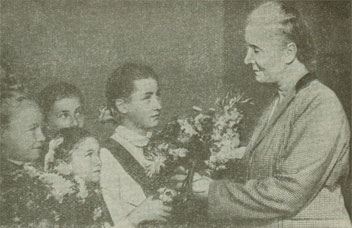
with pioneers of the Molotov Auto
Works in the town of Gorky
I love to come here, to walk along the dear familiar corridors of my children's school, which now bears Zoya's name. I look into the classrooms. I go up onto the third floor and approach the doors where there is an inscription: "Heroes of the Soviet Union Zoya Kosmodemyanskaya and Shura Kosmodemyansky studied in this classroom."
I enter this room, where the portraits of my children look down at me from the walls. There is the second desk in the middle row—Zoya used to sit there. Now another girl sits at this desk, and she has Zoya's clear eyes. And there that desk at the back of the next row—that was Shura's place. The girl who sits there now looks up at me. She is wearing a brown frock with a white collar and black apron, and she has such a grave thoughtful face.
I go downstairs to the little ones. I sit down at a low desk beside a little first-grader and open her reading book. On the cover of the book are golden ears of wheat, a blue sky, and pine trees—a well-loved picture of our own peaceful countryside. It seems to embody all that the book tells about. Every page of this book is a hymn to peaceful labour, to our native soil, to our forests and waters, to our people. Our country has straightened its shoulders; it is building and creating, it is sowing corn, smelting steel, raising from the ashes the burnt-out towns and villages. And it is rearing new, wonderful people.
This girl who sits beside me, and all her friends, and all the children throughout the Soviet land are being taught the greatest wisdom—to love their people, to love their Motherland. They are being taught to respect the labour and brotherhood of the peoples, to respect and value all the beautiful things that have been created by the peoples of the Earth.
They must be happy! They shall be happy!
 |
| The mother of Zoya and Shura with pioneers of the Molotov Auto Works in the town of Gorky |
So much blood has been shed, so many lives have been sacrificed that they might be happy, that a new war might not cripple their future!
Yes, many that were young, pure and honest are dead. Zoya and Shura are dead. Another pupil of School No. 201, a fine airman, Oleg Baiashov, died the death of a hero. Vanya Nosenkov, who once read us the poem about Maté Zalka, is dead. The hot arguer Petya Simonov is dead. Volodya Yuryev and Yura Braudo have lost their lives. The writer Arkadi Gaidar was killed during the first months of the war. Only a short while before Victory death claimed Pyotr Lidov, the war correspondent of Pravda…So many loved ones, so many sad losses. But by their feats, their valour, and their death, those that fell in this great and cruel struggle paved the road to Victory and Happiness.
And the living—work, build and create.
Here is a young woman with a kind, pleasant face coming down the corridor to meet me. She is Katya Andreyeva. She has done what she intended to do; she has become a schoolmistress teaching at her old school, the school where she studied together with Zoya and Shura.
My children's classmates are now engineers, doctors, teachers. They continue the work for the sake of which their comrades gave up their lives.
I walk along the familiar corridor. The door of the library is open. Shelf alter shelf along the walls is full of books, a great number of books.
"Before the war we had twenty thousand volumes. Now we have forty thousand," says Katya to me.
I go outside. The school is surrounded with green trees. There they are, the trees the children planted. And I seem to hear Zoya's voice:
"My linden is the third one—remember, Mummy."
Next: At the Buffalo Stadium
